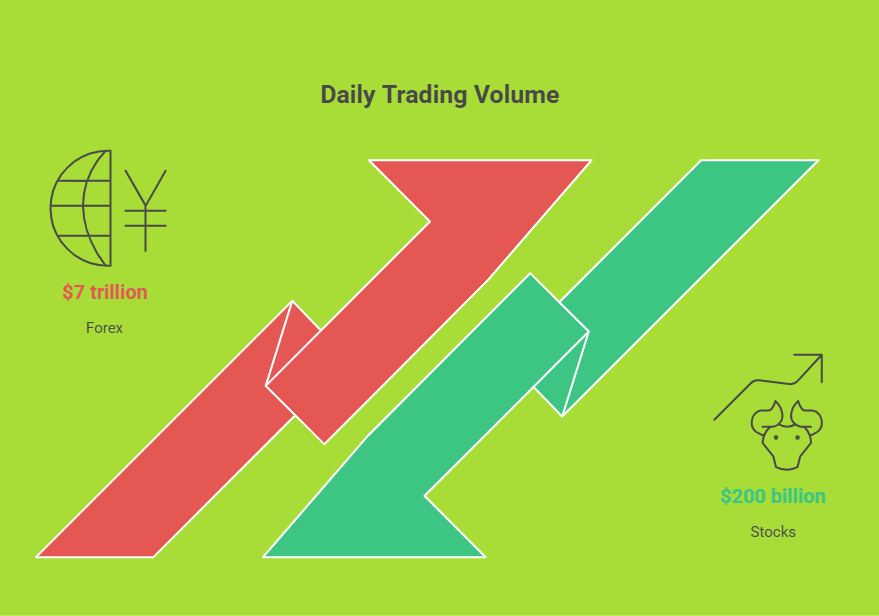Is Forex Easier Than Stocks?
The eternal debate amongst traders: Is Forex easier than stocks? This question surfaces daily across trading forums, coffee conversations, and investment communities worldwide.
Both markets have minted millionaires and, equally, humbled overconfident traders who underestimated their complexity.
Whether you’re contemplating your first $100 investment or managing substantial portfolios, understanding the fundamental differences between currency trading and stock ownership could determine your financial trajectory.
The forex market processes $7 trillion daily, compared to global stock markets’ $200 billion. Does size translate to simplicity?
Here’s what most trading guides won’t reveal about which market truly offers the clearer path to consistent profits.
UNDERSTANDING THE FOREX VS STOCKS LANDSCAPE
Before diving into whether Forex is easier than stocks, let’s establish what we’re comparing. The foreign exchange market operates as the world’s largest financial marketplace with $7 trillion daily turnover.
Stock markets function like exclusive auction houses where company shares change hands during specific hours under strict regulatory oversight.

For traders, both markets offer unique advantages. However, forex provides something particularly appealing: 24-hour market access five days a week.
While stock exchanges close at specific times, the forex market transitions seamlessly from London to New York, then to Sydney and Tokyo.
MARKET ACCESSIBILITY: ENTRY REQUIREMENTS COMPARED
Capital Requirements
Forex Market Entry: • Minimum deposits from $10-$500, depending on broker • Access to major currency pairs with micro lots ($0.10 per pip) • No commission fees with most retail brokers (spread-only trading) • Leverage up to 1000:1 for retail traders.
Stock Market Entry: • Individual shares range from dollars to hundreds per share • Commission fees typically $0-$10 per trade • No leverage for most retail investors (unless using CFDs) • Dividend payments provide additional income potential.
The accessibility crown goes to Forex. While building a diversified stock portfolio might require $1,000+, you can begin forex trading with genuine positions under $100.
Learning Curve Analysis
Many assume forex is easier because you’re tracking eight major currency pairs versus thousands of individual stocks. However, this oversimplifies both markets.
Forex Complexity Factors: • Macroeconomic indicators from multiple countries • Central bank policies and interest rate decisions • Geopolitical events affecting entire economies • Currency pair correlations.
Stock Complexity Factors: • Company-specific fundamental analysis • Industry trends and competitive positioning • Quarterly earnings and financial statements • Management decisions and corporate governance.
TRADING HOURS: THE 24/5 ADVANTAGE
Perhaps forex’s most compelling advantage lies in its trading schedule. The market operates continuously from Sunday 22:00 GMT to Friday 22:00 GMT.
Optimal Trading Sessions: • London Session (08:00-17:00 GMT): Highest EUR/GBP volatility • New York Session (13:00-22:00 GMT): USD-focused trading • Asian Session (22:00-08:00 GMT): JPY and AUD opportunities • Session Overlaps: Maximum liquidity periods.
This flexibility accommodates various lifestyles and schedules, unlike stocks, where you’re constrained by exchange hours.
LEVERAGE AND RISK: THE DOUBLE-EDGED SWORD
Understanding Forex Leverage
Forex leverage allows controlling $30,000 worth of currency with just $1,000 in your account (30:1 ratio). This amplification makes forex incredibly attractive—and potentially dangerous.
Leverage Benefits: • Amplified profit potential • Lower capital requirements for meaningful positions • Ability to diversify across multiple currency pairs.
Leverage Risks: • Equally amplified losses • Margin calls and position liquidation • Psychological pressure from leveraged positions.
Stock Market Risk Profile
Traditional stock investing typically involves no leverage, meaning your maximum loss is limited to your initial investment.
However, this “safety” comes with reduced profit potential and higher capital requirements.
IS FOREX RISKIER THAN STOCKS?
This question deserves serious consideration. The answer depends largely on your approach to each market.
Forex Risk Factors: • High leverage amplifies both gains and losses • Currency volatility during economic events • 24-hour markets mean constant exposure • Macroeconomic factors affect entire economies.
Stock Risk Factors: • Individual company failure can result in total loss • Market gaps between sessions can trigger significant losses • Less liquidity in smaller stocks • Sector-specific risks can devastate portfolios.
Many professional traders consider forex less risky due to superior liquidity and the fact that major currencies rarely become worthless overnight, unlike individual companies.
MARKET ANALYSIS: TECHNICAL VS FUNDAMENTAL
Forex Analysis Approach
Forex trading heavily favours technical analysis, making it potentially easier for traders who prefer chart patterns over financial statements. Major currency pairs exhibit reliable technical behaviours.
Popular Forex Analysis Methods: • Price action trading • Support and resistance levels • Moving average strategies • Economic calendar events.
Stock Analysis Requirements
Stock trading demands comprehensive analytical approaches, combining technical chart analysis with fundamental company research.
Essential Stock Analysis Components: • Company financial statements • Industry competition analysis • Technical chart patterns • Macroeconomic factors affecting sectors.
PSYCHOLOGY AND TRADING DISCIPLINE
The psychological differences between forex and stock trading often determine long-term success more than technical knowledge.
Forex Psychology
The 24/5 nature creates unique psychological challenges. Positions can move against you whilst sleeping, and constant market availability can lead to overtrading.
However, high liquidity means quick position exits when needed.
This raises an important question: Is Forex trading gambling or skill? The answer lies in your approach, risk management, and psychological discipline rather than the market itself.
Stock Psychology
Stock trading often feels more “investible” because you’re buying actual company ownership.
This psychological comfort can lead to better long-term decisions, but may result in emotional attachment to losing positions.
COST STRUCTURE COMPARISON
Forex Trading Costs:
• Spreads: 0.6-2.0 pips on major pairs • Overnight financing: ±2-5% annually on leveraged positions • No commission fees with most brokers
Stock Trading Costs:
• Commission: $0-$10 per trade • Platform fees: $0-$25 monthly • Currency conversion: 0.25-1.5% for international stocks
For frequent traders, forex’s spread-only structure often proves more cost-effective.
Practical Trading Strategies
Effective Forex Strategies:
Beginner-Friendly Approaches: • EUR/USD trend following during active sessions • Range trading during low volatility periods • Economic news trading around central bank announcements.
Advanced Techniques: • Correlation trading between related pairs • Multi-timeframe analysis for precise entries • Central bank intervention recognition.
Practical Stock Strategies:
Long-Term Approaches: • Dividend investing for steady income • Growth stock accumulation in emerging sectors • Index fund investing for diversified exposure.
Active Trading Methods: • Earnings momentum trading • Technical breakout strategies • Sector rotation based on economic cycles.
MAKING YOUR DECISION: FOREX VS STOCKS
So, is Forex easier than stocks? The answer depends on your circumstances, goals, and temperament.
Choose Forex If You:
• Prefer flexible trading hours • Have limited starting capital • Enjoy technical analysis over fundamental research • Want higher leverage potential • Can handle 24/5 market exposure • Prefer liquid, fast-moving markets.
Choose Stocks If You:
• Prefer long-term wealth building • Enjoy researching companies and industries • Want business ownership • Prefer scheduled trading hours • Seek dividend income potential • Value fundamental analysis skills.
The Hybrid Approach
Many successful traders utilize both markets strategically: • Long-term stock investments for retirement planning • Active forex trading for shorter-term profits • Diversification benefits from uncorrelated exposure • Skill development across multiple asset classes.
RISK MANAGEMENT: YOUR TRADING FOUNDATION
Regardless of your choice, risk management determines survival and success.
Essential Risk Controls
Universal Risk Management Principles: • Position sizing: Never risk more than 1-2% per trade • Stop losses: Always define maximum acceptable loss • Diversification: Spread risk appropriately • Emotional discipline: Stick to your trading plan.
Forex-Specific Controls: • Currency correlation awareness • Economic calendar monitoring • Leverage management.
Stock-Specific Controls: • Sector diversification • Company size distribution • Earnings announcement timing.
CONCLUSION: YOUR TRADING PATH FORWARD
The question “Is Forex easier than stocks?” lacks a universal answer because “easier” means different things to different traders.
Forex offers unparalleled accessibility, flexible hours, and lower capital requirements, making it easier to start.
Stocks provide ownership opportunities, dividend income, and potentially more predictable wealth building, making them easier to understand and hold long-term.
Success in either market comes from education, discipline, and consistent risk management rather than the market choice itself.
The most successful traders often master one market thoroughly before expanding, developing transferable skills across all financial markets.
Whether you choose fast-paced currency trading or ownership-focused stock investing, begin with education, practice with demo accounts, and never risk money you can’t afford to lose.
Both markets reward preparation, patience, and disciplined execution.

 English
English
 German
German  Italian
Italian  Hi, User
Hi, User 


Post a Reply
You must be logged in to post a comment.